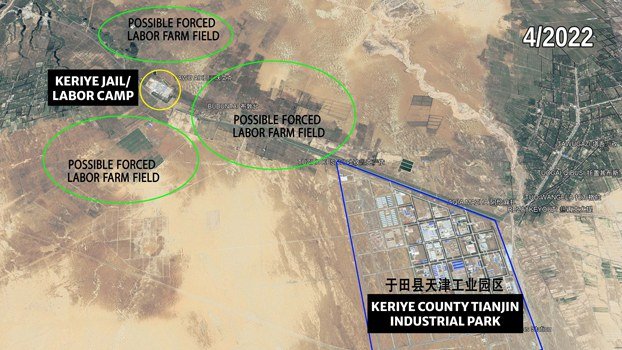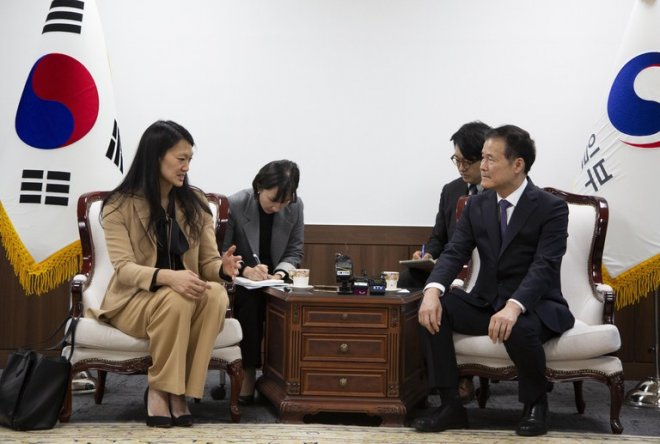New York exhibit keeps dream of a democratic China alive – across the generations
Former student leaders of China"s 1989 pro-democracy movement launched an exhibit of the Tiananmen massacre in Manhattan on Friday in a bid to keep alive the dream of freedom and democracy amid an ongoing information blackout back home.The June 4 Memorial Hall"s opening was timed to mark the 34th anniversary of the massacre of unarmed civilians by People"s Liberation Army troops that ended weeks of mass protests on Beijing"s Tiananmen Square, which falls on Sunday.
"1989 was the most important turning point in recent Chinese history," former student leader Wang Dan told journalists at the launch. "The Chinese authorities ... want to cover up that history and have the world forget their crimes."
The events of the spring and early summer of 1989 are still a hugely sensitive topic in China, where public discussion is heavily censored and public mourning for victims is banned.
Wang said remembering the Tiananmen massacre isn"t just about remembering the past, but also about aspirations for freedom and democracy for China"s future.
 A man stands next to the blood-stained shirt of Jiang Lin, a reporter for the army newspaper who was injured by police with electric prods in Tiananmen Square on June 3. Credit: Reuters
A man stands next to the blood-stained shirt of Jiang Lin, a reporter for the army newspaper who was injured by police with electric prods in Tiananmen Square on June 3. Credit: Reuters"We must keep up the opposition [to the regime] and hold our power in reserve for the future," he said.
The memorial hall crams photos, contemporary news articles, banners, letters and even blood-stained items of clothing into a small venue on the fourth floor of a Sixth Avenue office building.
Bao Tong’s calligraphy
Among them is a calligraphic inscription of the words "June 4 Memorial Hall" in Chinese made specially by former top Communist Party aide Bao Tong shortly before his death in November 2022, which curator Yu Dahai said was beautifully written, but somewhat shaky, revealing Bao"s frail state of health at the time.
Bao"s last writings to be published by Radio Free Asia in June 2022 gave a detailed description of conversations among top Chinese leaders behind the scenes as a political crisis sparked by the crisis unfolded.
"The student-led mass popular protests of 1989 are the thing I am most proud to have experienced in my entire life," he wrote in conclusion.
"Power gained by evil means is still evil,” he wrote. “And just demands that result in a massacre are still just."
 A mimeograph machine used by students to print flyers and information during the Tiananmen Square demonstrations in 1989 is displayed at the June 4 Memorial Hall. Credit: Reuters
A mimeograph machine used by students to print flyers and information during the Tiananmen Square demonstrations in 1989 is displayed at the June 4 Memorial Hall. Credit: ReutersOne of the exhibits is a heavy mimeograph machine used by former student leader Zhou Fengsuo to crank out notices and information for fellow protesters that was carried out of Tiananmen Square by some students from Tsinghua University – who, along with Zhou, were the last group to leave on the night of June 3, 1989.
"I asked them why they were bothering to lug along such a heavy item at a time like this, and they said they needed it to keep up the fight," he said, adding that seeing the machine again was like "being reunited with an old friend."
Symbol of Hope
Zhou, who founded the U.S.-based rights group Humanitarian China, said the collection of more than 100 items is a symbol of hope for his generation, whose dreams of a more democratic China were shattered by the military response.
"It doesn"t matter how big a defeat we have suffered or the struggles we have been through -- we are still hopeful," Zhou said. "The dream of a democratic China lives on."
He said many of the items on display at the exhibit were given to him anonymously by political prisoners he had helped, or their families.
"The people who took part in these protests wanted these items displayed and preserved, but at the same time, they wanted their identities protected," Zhou said.
 Members of the June 4 Massacre Memorial Association committee from right to left; Yu David, Wang Dan and Zhou Fengsuo listen to questions during a press conference at the June 4 Memorial Hall on Thursday, June 1, 2023, in New York. Credit: Associated Press
Members of the June 4 Massacre Memorial Association committee from right to left; Yu David, Wang Dan and Zhou Fengsuo listen to questions during a press conference at the June 4 Memorial Hall on Thursday, June 1, 2023, in New York. Credit: Associated PressAnd it"s not just Zhou"s Gen X veteran dissidents who are inspired by the project.
Many of those who volunteered their time to ready the exhibit for launch are younger Chinese people who were inspired by the "white paper" protests across China in November 2022.
One of them, who gave only his surname Dong, served seven months in jail for wearing a T-shirt commemorating the massacre.
"The mainstream environment in China is dominated by [government supporters]," said Dong, who also took part in the "white paper" movement.
"But since I came to New York and found a bunch of like-minded people, I found I wasn"t alone."
‘We all want democracy’
Many of the exhibits are from later mass movements, including the now-banned candlelight vigils in Hong Kong"s Victoria Park and artwork from the 2019 protests against the city"s diminishing freedoms.
Wang said there appears to be a direct connection spanning the generations.
"Our two generations share the same values – we all want democracy for China," Wang Dan said. "We share the same dream."
 Men stand next to a poster memorializing those killed during Tiananmen Square demonstrations in 1989, during a press preview of the June 4 Memorial Hall in New York on Thursday, June 1, 2023. Credit: Reuters
Men stand next to a poster memorializing those killed during Tiananmen Square demonstrations in 1989, during a press preview of the June 4 Memorial Hall in New York on Thursday, June 1, 2023. Credit: ReutersWang said the exhibit has already been targeted by an army of pro-Beijing trolls, who have set up large numbers of fake accounts for the June 4 Memorial Hall on Twitter.
"Online harassment is to be expected," he said. "A memorial hall like this is clearly going to be a thorn in the side of the Chinese Communist Party ... and we have made preparations for this ... with the [U.S. authorities]."
Meanwhile, the government continues to silence any attempts to commemorate the date or talk about what happened among the 1.4 billion citizens within China"s borders.
"The June 4 crackdown proved that the Chinese Communist Party is essentially a political party that relies on violence to maintain its rule," Wang wrote in a May 29 commentary for Radio Free Asia.
"The whole world knows what happened in China, but many Chinese people don’t even know about it," he said.
Translated by Luisetta Mudie. Edited by Malcolm Foster.
[圖擷取自網路,如有疑問請私訊]
|
本篇 |
不想錯過? 請追蹤FB專頁! |
| 喜歡這篇嗎?快分享吧! |
相關文章
AsianNewsCast























